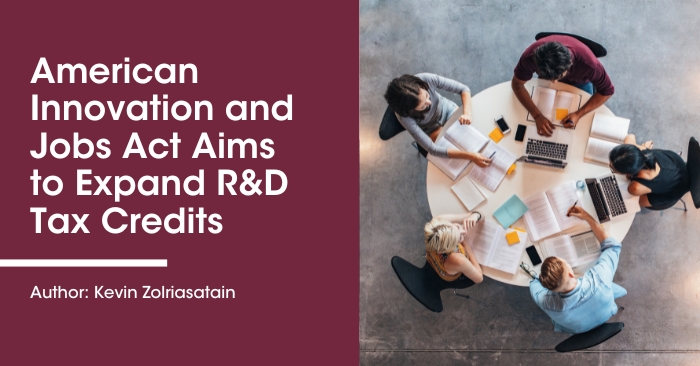American Innovation and Jobs Act Aims to Expand R&D Tax Credits and Address Confusion Over Section 174 Rules
by Kevin Zolriasatain | Principal, KBKG, 3/23/2023
On March 17, 2023, Senators Maggie Hassan (D-NH) and Todd Young (R-IN) reintroduced the American Innovation and Jobs Act (“The Act”). This act aims to expand the refundable R&D Credit and will extend the credit to more startups and small businesses. The bill also addresses a important reversal of the 2017 tax law that clarifies the amortization rules for specific research and experimental expenditures. This change ensures that companies can fully deduct R&D investments annually.
The American Innovation and Jobs Act has received overwhelming support from both Democrats and Republicans. Its primary objectives are to restore incentives for long-term R&D investments, raise the cap for the refundable R&D Tax Credit for small businesses and startups, and expand eligibility for the refundable R&D tax credit. The intent is to make it more accessible to startups and small businesses.
Expanding the R&D Tax Credit for Increased Research Activities
The Act has received overwhelming support from both Democrats and Republicans, and its primary objective is to restore incentives for R&D investments in the United States. Aside from reinstating the full expensing of R&E expenses, The Act would significantly expand the Section 41 Credit for increasing research activities for startup companies by:
- Doubling the cap for the refundable portion of the R&D credit from $250,000 to $500,000 and ultimately raising it to $750,000 in ten years
- Expanding the credit rate for startups from 14% to 20%
- Expanding eligibility for the payroll tax credit by increasing the gross receipts threshold to $15M from $5M
- Increasing the period startups can claim the refundable credit from 5 years to 8 years
KBKG Insight
The 2017 Tax Cuts and Jobs act did not materially impact the Section 41 credit for increasing research activities. While this new Act aims to restore immediate expensing of Section 174 costs, it would also significantly expand the population of companies that would qualify for the payroll tax credit.
Historical Treatment of Section 174
Section 174 of the Internal Revenue Code historically allowed taxpayers to choose whether to deduct research and experimental expenditures as current expenses or capitalize and amortize them over time. This treatment incentivized businesses to invest in research and development, leading to drastic increases in innovation and growth in the U.S. in recent decades.
However, in 2017, the treatment of R&E expenditures changed significantly due to the Tax Cuts and Jobs Act, which had a negative impact on taxpayers and created confusion around how to treat the expenses. Currently, the rule states that research and experimental expenditures, including software development costs, are required to be capitalized and amortized ratably over 60 months (180 months for foreign R&E expenditures).
Forthcoming Guidance on Section 174 Research & Experimentation Expenditures
In addition to the proposed bill, news has been circulating related to taxpayers’ concerns over Section 174. During the Tax Executives Institute’s 73rd Midyear Conference in Washington, D.C., several government officials from the Treasury Department and IRS acknowledged that although some preliminary guidance had been issued to implement significant tax legislation across various areas of the Tax Code, including but not limited to Section 174, a considerable amount of work remains.
With many unresolved issues and gray areas of interim guidance, proposed regulations, and forthcoming clarity from the IRS, the federal representatives were cautious not to overcommit regarding what to expect next from the department or the agency.
During his speaking session, IRS Associate Chief Counsel Scott Vance remarked that the most challenging aspect is determining the ratio between Section 174 expenditures and qualified research expenses (QREs) under the Code Sec. 41 R&D tax credit. The difficulty arises from identifying the excess amount that is not eligible for QREs. When pressed about timelines on guidance, Vance expressed optimism that subsequent guidance may be released before the end of 2023.
The AICPA Urges Congress to Extend Amortization Requirements
Earlier this year, the American Institute of Certified Public Accountants (AICPA) wrote to Congress, urging them to extend the amortization requirement for research and experimental expenditures under Internal Revenue Code Section 174 until 2026. The AICPA argued that extending the requirement by four years would simplify tax compliance and minimize confusion related to identifying costs that should be capitalized versus expensed. Additionally, the AICPA is calling for a permanent extension of deductions for Section 174 expenditures to avoid conflict and litigation.
The AICPA’s recommendation aligns with the broader concerns of the business community about the impact of tax policy on research and development, as many businesses argue that the tax system should incentivize research and development rather than impose additional costs and administrative burdens.
In summary, while the American Innovation and Jobs Act proposes to address the negative impact of the Tax Cuts and Jobs Act on research and experimental expenditures, businesses still need to grapple with the confusion and complexity surrounding Section 174 until it is passed. It is anticipated that more updates will be released in the coming months as the pressure mounts on taxpayers to account for the changes effective for tax years beginning after December 31, 2021. In the meantime, companies must seek guidance from experts who understand the nuances of the tax law and can help navigate the changing landscape.
With the recent changes and proposed updates, ensuring that your business is in compliance and taking advantage of all available tax benefits is essential. For questions regarding the R&D Tax Credit, Section 174 R&E expenditures, and more, our team of experts at KBKG is here to help. Contact us today for an estimate of your R&D Tax Credit benefit.
Related Articles
- AICPA Pens Letter Urging Congress to Defer R&D Expense Capitalization (Sec 174) Provision Until 2026
- IRS Issued Additional Guidance on Section 174, Specified Research or Experimental Expenditures
- KBKG Tax Insight: Tax Court Denies Construction Company R&D Credits
About the Author
 Kevin Zolriasatain – Principal
Kevin Zolriasatain – Principal
Pasadena
Kevin is a Principal and Practice Leader of KBKG’s Research and Development (R&D) Tax Credit Services from our Pasadena headquarters. He has over 20 years of consulting experience providing R&D tax credit services to companies of various sizes. Prior to KBKG, he spent nearly a decade at PricewaterhouseCoopers, focusing on securing R&D Tax Credits for Fortune 500 companies. Kevin enjoys working with small to mid-size business owners and over his career has documented hundreds of millions of dollars in research credits. » Full Bio


